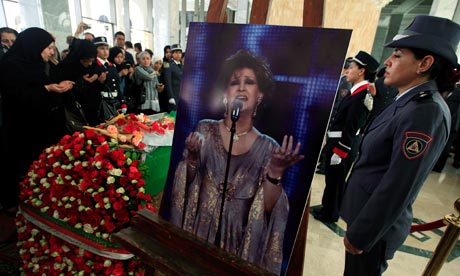The Algerian singer died in Cairo on 17 May, but her pleas for
freedom and democracy will live on across the Arab world

Mourners at the funeral ceremony of Warda al-Jazairia in Algiers on 19 May 2012. Photograph: Zohra Bensemra/Reuters
By Nabila Ramdani

Mourners at the funeral ceremony of Warda al-Jazairia in Algiers on 19 May 2012. Photograph: Zohra Bensemra/Reuters
Every
revolution has its soundtrack, and right now it is the music of Warda
al-Jazairia that is dominating the Arab world. The 72-year-old singer died on
17 May, following a career that not only encompassed popular music and film but
was also deeply enmeshed in politics. Her pleas for freedom and democracy for
the Arab people could be as melodic as the love songs that first propelled her
to international fame. Little wonder, then, that classics like Listen to Me
have been adopted and adapted by demonstrators from Damascus to Tunis as they
try to make themselves heard.
There
is a particular poignancy to the passing of Warda here in Egypt, her adopted
country. She moved to Cairo in the 1970s, when the capital was the heart of the
Arab world's cultural scene, and it is now at the centre of its political
aspirations. Hugely important presidential elections take place on 24 and 25
May, when it will be the first time that Egyptians can choose a leader. It is
not only them but democrats the world over who want to see the hope and
idealism of the Arab spring translated into representative government.
Last
year Tahrir Square became the tangible symbol of such aspirations as hundreds
of thousands packed into it to demand change. An 18-day revolt not only ended
the dictatorship of Hosni Mubarak, but galvanised protestors throughout the
Middle East and North Africa. Wandering around the busy traffic island
translated as "Liberation Square" today ,you do not get anything like
the same feeling of history, but still the sound of Warda is everywhere. It
belts out of cheap transistor radios in torn tents, just as it is played
constantly over the sound systems of upmarket western hotels, restaurants and
cafes. On Friday I even heard a national prayer being said for Warda at the Al
Hussein Mosque as worshippers eulogised a woman they loved and respected.
Nobody
is pretending that the elections are the solution to Egypt's future. Secular
voters fear that Mubarak's autocracy will be replaced by an Islamic one. The
military remains as powerful and sinister as ever, with humans rights groups
accusing them of murder and torture. International monitors have arrived to
oversee the poll, but they are already complaining of interference, and
vote-rigging remains a major concern.
Warda
was as aware as anyone of how democratic ideals could be as far away from
reality as her poetic lyrics. She was the daughter of an Algerian father and a
Lebanese mother, and as a child sang nationalist Algerian songs in her father's
Paris cafe. Collections were made to fund the FLN, Algeria's National
Liberation Front, which spearheaded the bloody colonial struggle against the
French. Warda's family were eventually deported for their links with terrorism
(arms were found hidden alongside the coffee bags), and ended up in civil-war
ravaged Beirut. There Warda's anger about all forms of oppression was further
stirred up by meetings with Palestinian refugees and militant political exiles
from every corner of the Arab world.
Given
such radical fervour, it is almost comical to consider that the relatively
anodine My Times Are Sweeter With You was Warda's first huge hit in Cairo. She
recorded some 300 other songs, sold more than 100m albums around the world, and
took the lead role in five feature films, proving that brutal realpolitik need
not be translated into abject cynicism. Her anthem We're Still Standing was
recorded to mark the 50th anniversary of Algerian Independence this year for
good reasons beyond Warda's banal nickname of "Algeria's Rose". It
had been the same when President Nasser of Egypt involved her in his grand
Pan-Arabism project, inviting her to sing in an indisputably idealistic (if
schmaltzy to some) opera called My Greater Homeland.
Warda
started her life singing on behalf of Algerian independence, and gradually
built up her repertoire to encompass the Arab world. She, of all people, would
have appreciated the high drama of exiting at the tail-end of the Arab spring.
She got some things very wrong (there was a flirtation with the hair-brained
nationalistic ideology of Muammar Gaddafi), but she knew that popular culture
was crucial to popular political action. Her role was ultimately that of an
artist using words and melody to instill hopes for a better future for all.
Warda's life work was never likely to change the world, but as long as Arabs
call for real change, she will be singing alongside them for a long time to
come.
-This commentary was published in The Guardian on 21/05/2012
-Nabila Ramdani is a Paris-born freelance journalist and academic of Algerian descent. She specialises in Anglo-French issues, Islamic affairs, and the Arab World. Nabila is also particularly interested in America's War on Terror in the Muslim world. She was named a Young Global Leader 2012 by the World Economic Forum and was a winner of the inaugural European Muslim Woman of Influence Award in 2010
-Nabila Ramdani is a Paris-born freelance journalist and academic of Algerian descent. She specialises in Anglo-French issues, Islamic affairs, and the Arab World. Nabila is also particularly interested in America's War on Terror in the Muslim world. She was named a Young Global Leader 2012 by the World Economic Forum and was a winner of the inaugural European Muslim Woman of Influence Award in 2010
No comments:
Post a Comment